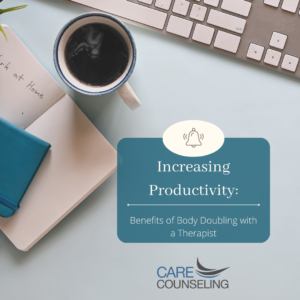Benefits of Body Doubling with a Therapist
 Do you have a hard time knowing where to start on tasks due to feeling overwhelmed or disorganized?
Do you have a hard time knowing where to start on tasks due to feeling overwhelmed or disorganized?
Is it difficult to find the energy and motivation to get started on tasks?
Do you struggle with procrastination and productivity?
Is it hard to stay focused and engaged long enough to complete tasks?
If so, working with a body double may be a great solution to help increase your productivity.
Body doubling is a technique where another person works alongside (in person or virtually) as you complete a task that may otherwise be challenging.
Those with Attention-Deficit Hyperactivity Disorder (ADHD) or other neurodivergence such as Autism Spectrum Disorder (ASD) may especially benefit from getting thing with an activity partner or body double. Depression is another area since symptoms can impact decreased interest and motivation in activities, impacted by imbalances in brain chemicals such as dopamine and serotonin. Struggles with executive functioning skills such as planning, organization, and time management combined with the impact of one’s mood can make daily tasks a challenge.
Focusmate, an online community for body doubling, identified five behavioral triggers that helps body doubling be an effective strategy.
- Task implementation
- Social Pressure
- Accountability
- Specific Task Direction
- Hacking you Brain Chemistry
Body doubling can easily be incorporated within your therapy session. Goals and objectives can be created around a particular task to start implementing. Having regular, recurring days and times to meet helps build routine. The therapist can help create structure and serve as an accountability partner. Additional benefits of body doubling with the mental health specialist include:
- Learning new skills through instruction and modeling
- Gaining self-mastery by practicing effective strategies within session
- Finding creative ways to make tasks less boring
- Receiving encouragement and positive reinforcement to build momentum
- Practicing regulating emotions such as frustration, annoyance, anger while engaging in tasks that trigger these
- Learning more about oneself- including mental health challenges and strengths
Other strategies that others have used include apps on phones and computers, planners, checklists, and reminders. Some individuals find a lot of benefit from strategies such as a change in the environment. Going to a library or coffee shop to do focused work, and doing these alongside a friend or colleague can help; however, there can be challenges due to the logistics/ executive functioning skills required. The presence of the body double with a friend may be distracting. Friends and family as body double may not be helpful, if behaviors are unsupportive or shaming. For example, if someone is struggling with keeping their living space clean or decluttered, a friend may come into the environment with judgement. Therapy provides the benefits of nonjudgmental support, combined with education and training of evidence-based strategies that can be tailored to one’s unique needs.
Written By: Charlotte Johnson, MA, LPCC



























